If I suggested that one reason you might be gaining weight and suffering from various food allergies is that you’re not getting enough salt, you might think I’m crazy. With all the attention the American Heart Association has placed on salt restriction for blood pressure, you’d think we all get way too much salt. But is that the truth?
Obviously, people who eat a lot of processed and/or restaurant food are eating a ton of salt. One study found that 77% of the sodium we eat in the U.S. comes from salt added to processed foods. While I’m not convinced this salt is causing high blood pressure—I think sugar and other additives in processed foods are a much bigger issue—many of these folks don’t have a salt deficiency. But there’s another group of people who very well could be deficient in sodium.
That group is the crowd that eats primarily health food. Think about it. Most of these folks have cut down on carbs, including salty chips, pretzels, and popcorn. They’re using other seasonings instead of salt, such as garlic, peppers, and cinnamon. All of these are great healthy choices that can make a huge difference in your health. But many times we go too far and cut too much salt out of our diets.
In fact, we received a letter from someone the other day saying, “Though I have not changed my eating habits and started working out, I have gained 20 lbs over the last six months. I eat healthy and have been unable to lose weight. My doctor is not concerned, but I am. I need help.” This happens more often than you might imagine. In fact, many people who go on low-carb diets end up in this situation. Not all of them struggle with sodium deficiency, but it’s definitely a concern.
And, frankly, salt isn’t the child of Satan we make it out to be. Your body needs sodium to control the balance of your bodily fluids. These fluids help your tissues stay hydrated, and even keep your cells healthy. The movement of blood is dependent on salt. One patient of mine recently went to donate blood, but couldn’t because the blood wouldn’t flow well enough. They were dehydrated—even though they drink a lot of fluid. Their salt intake was quite low, and prevented the donation. Just drinking water won’t hydrate you as well as taking in some sodium as well. That’s why athletes usually drink beverages with sodium.
So how can you tell if you’re sodium deficient? It’s pretty easy. The first sign is that you’ll crave foods that have a lot of salt in them. This could include foods that don’t necessarily taste salty, but still have a lot of salt in them, such as bread, crackers, cookies, anything canned, and restaurant meals. You also might crave sausage, bacon, olives, and cheese.
Another sign of sodium deficiency is inexplicable fatigue. This might include a depressed mood and low energy. There are a lot of things that could cause this, but a sodium deficiency is one consideration. An extreme example of fatigue is muscle cramps or slow recovery from exercise. When your body doesn’t have enough sodium, your muscles fatigue and don’t recover fast.
This can lead to weight gain. In fact, a study just came out showing how eating salt can help you lose weight. The study found that salt actually helps your body break down fat.
Finally, another sign of chronic sodium deficiency is food allergies. If you’ve started having various food allergies, it’s quite possibly a sodium deficiency. That’s because a sodium deficiency can lead to an allergy of just about any type of food. There are some food allergies I wouldn’t attribute to sodium deficiency, particularly peanut allergies. But there are so many it can cause, I can’t list them all.
So what’s the solution? It’s simple. Buy some quality sea salt and season your food to taste. Salt isn’t bad for you, and you don’t need to be scared of it. Quality sea salt is great for you, and should be enjoyed regularly.
Obviously, if you notice eating salt causes your blood pressure to spike, then you probably don’t have a sodium deficiency—or you have other issues causing your hypertension. Work with a naturally oriented doctor to find out why your pressure is high before indulging in too much salt.
Reference:
https://drudgenow.com/article/?n=0&s=2&c=1&pn=Anonymous&u=http://www.dailymail.co.uk/health/article-4506846/Eating-salt-help-LOSE-weight-study-reveals.html.
